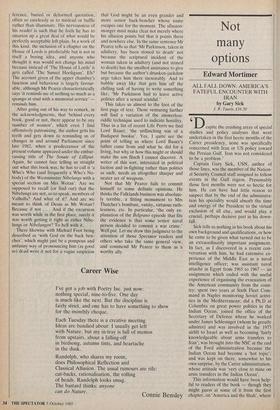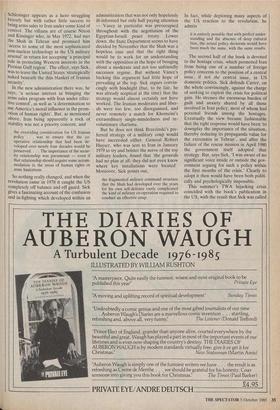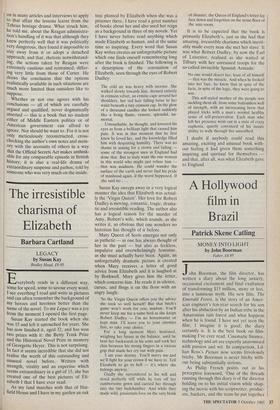Not many options
Edward Mortimer
ALL FALL DOWN: AMERICA'S FATEFUL ENCOUNTER WITH IRAN by Gary Sick I. B. Tauris, £16.50 Despite the crushing array of special studies and policy analyses that were undertaken in the first hectic months of the Carter presidency, none was specifically concerned with Iran or US policy toward the Persian Gulf. Iran was not considered to be a problem.'
Captain Gary Sick, USN, author of those lines, was the member of the Nation- al Security Council staff assigned to follow events in the Gulf region. Presumably those first months were not so hectic for him. He can have had little reason to suspect that by the end of the administra- tion his speciality would absorb the time and energy of the President to the virtual exclusion of all else, and would play a crucial, perhaps decisive part in his down- fall.
Sick tells us nothing in his book about his own background and qualifications, or how he came to be given what turned out to be an extraordinarily important assignment. In fact, as I discovered in a recent con- versation with him, he had extensive ex- perience of the Middle East as a naval intelligence officer; was assistant naval attaché in Egypt from 1965 to 1967 — an assignment which ended with the useful experience of organising the evacuation of the American community from the coun- try; spent two years at Sixth Fleet Com- mand in Naples monitoring Soviet activi- ties in the Mediterranean; did a Ph.D at Columbia on great power politics in the Indian Ocean; joined the office of the Secretary of Defence where he worked under James Schlesinger (whom he greatly admires) and was involved in the 1973 airlift to Israel as well as becoming 'fairly knowledgeable about arms transfers to Iran'; was brought into the NSC at the end of the Ford administration because the Indian Ocean had become a 'hot topic'; and was kept on there, somewhat to his own surprise, by the Carter administration, whose attitude was 'very close to mine on arms transfers in the Indian Ocean'.
This information would have been help- ful to readers of the book — though they might guess at some of it from the first chapter, on 'America and the Shah', where Schlesinger appears as a hero struggling bravely but with rather little success to bring arms sales to Iran under some kind of control. The villains are of course Nixon and Kissinger who, in May 1972, had met the Shah in Tehran and promised him `access to some of the most sophisticated non-nuclear technology in the US military arsenal' in return for accepting 'a principal role in protecting Western interests in the Persian Gulf region'. The effect, says Sick, was to leave the United States 'strategically naked beneath the thin blanket of Iranian security'.
In the new administration there was, he says, `a serious interest in bringing the arms sales program with Iran under effec- tive control', as well as 'a determination to use America's moral influence in the prom- otion of human rights'. But, as mentioned above, Iran being apparently a rock of stability was not a priority concern, and
the overriding consideration for US Iranian policy . . . was to ensure that the co- operative relationship that had been de- veloped over nearly four decades would be preserved. . . The importance of the secur- ity relationship was paramount — even if that relationship should require some accom- modation in the areas of human rights or arms limitations.
So nothing really changed, and when the revolution came in 1978 it caught the US Completely off balance and off guard. Sick gives a fascinating account of the confusion and in-fighting which developed within an
administration that was not only hopelessly ill-informed but only half paying attention — Vance in particular was preoccupied throughout with the negotiation of the Egyptian-Israeli peace treaty. Lower down, the State Department seems to have decided by November that the Shah was a hopeless case and that the right thing would be to work for an understanding with the opposition in the hope of bringing about a moderate and not too unfriendly successor regime. But without Vance's backing this argument had little hope of prevailing at the top. Sick argues convin- cingly with hindsight (but, to be fair, he was already sceptical at the time) that the strategy would almost certainly not have worked. The Iranian moderates and liber- als were too few, too disorganised, and never remotely a match for Khomeini's extraordinary single-mindedness and re- volutionary charisma.
But he does not think Brzezinski's pre- ferred strategy of a military coup would have succeeded either. General Robert Huyser, who was sent to Iran in January 1979 to try and bolster the nerve of the top military leaders, found that 'the generals had no plan at all; they did not even know where key installations were located'. Moreover, Sick points out,
the fragmented military command structure that the Shah had developed over the years for his own self-defence vastly complicated the kind of military co-operation required to conduct an effective coup.
In fact, while deploring many aspects of the US reaction to the revolution, he admits
it is entirely possible that with perfect under- standing and the absence of deep cultural bias, the actual policy decisions would have been much the same, with the same results.
The second half of the book is devoted to the hostage crisis, which promoted Iran from being one of a number of foreign policy concerns to the position of a central issue, if not the central issue, in US domestic politics. Sick defends Carter, on the whole convincingly, against the charge of seeking to exploit the crisis for political gain. He stresses the enormous burden of guilt and anxiety shared by all those involved in Iran policy, most of whom had personal friends among the hostages. Eventually the view became fashionable that the right response would have been `to downplay the importance of the situation, thereby reducing its propaganda value for the extremists in Tehran', and after the failure of the rescue mission in April 1980 the government itself adopted that strategy. But, says Sick, 'I was aware of no significant voice inside or outside the gov- ernment arguing for such a policy within the first months of the crisis.' Clearly to adopt it then would have been both politi- cally and psychologically impossible.
This summer's TWA hijacking crisis coincided with the book's publication in the US, with the result that Sick was called
on in many articles and interviews to apply to that affair the lessons learnt from the Tehran hostage drama. What struck him, he told me, about the Reagan administra- tion's handling of it was that although they knew perfectly well that it was politically very dangerous, they found it impossible to stay away from it or adopt a detached approach; and that, rhetoric notwithstand- ing, the actions taken by Reagan were extremely cautious and restrained, differ- ing very little from those of Carter. He draws the conclusion that the options realistically available in such situations are much more limited than outsiders like to suppose.
Whether or not one agrees with his conclusions — all of which are carefully argued and qualified, never dogmatically asserted — this is a book that no student either of Middle Eastern politics or of American government can afford to ignore. Nor should he want to. For it is not only meticulously reconstructed, cross- checking the author's own notes and mem- ory with the accounts of others in a way that the Official Secrets Act makes unthink- able for any comparable episode in British history; it is also a real-life drama of extraordinary suspense and pathos, told by someone who was very much on the inside.




























































 Previous page
Previous page